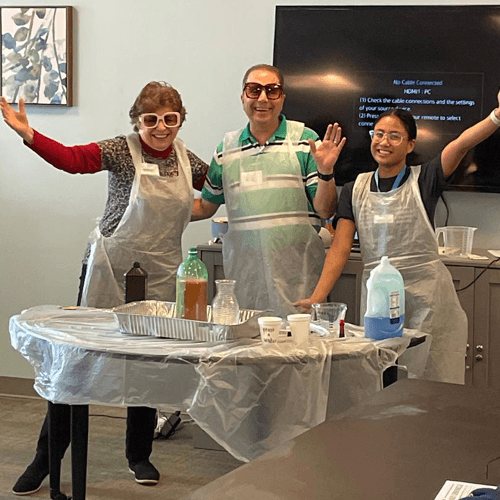
6 Reasons to Use Adult Day Services
Receiving an Alzheimer's or dementia diagnosis is daunting enough, but navigating all the options for care can quickly become even more overwhelming. One option that many have never heard of? Adult Day Programs. While we might be a bit biased here at Insight, we believe that day centers and day programs can be the perfect happy medium for many families - support, engagement, and safety during the day, and the comforts of family and home in the evening. In honor of National Adult Day Services Week, here are a few reasons to consider a day program.
1. Improve Quality of Life
We believe that everyone should be provided with the best quality of life possible. Through all of our programming, day centers work hard to enhance the lives of thousands of individuals and families living with dementia each year. Participants are active and engaged in programming from the early to late stages of the disease, and care partners have the support, education, and respite they need to be successful in their caregiving roles.
Studies show that Adult Day Services:
- Increase cognitive function, ambulation, strength, and flexibility, pleasure and interest, quality of life, time at home in the community, and overall functioning.
- Decrease agitation, depression, psychoactive medication use, falls, need for nursing home care.
2. Loved Ones Remain at Home
Many dementia patients move into assisted living prematurely due to lack of care options. Day programs allow your loved one to continue living in their own environment and stay a part of their community, while receiving the services and support they need. Highly trained in dementia care, Insight staff consists of nurses, CNAs, social workers, recreation therapists, and other professionals.
3. Families Receive Holistic Care
We strive to serve the whole family. A day nurse can provide services, but there is a lack of group socialization. A family member can become a full-time caregiver, but that increases the family member’s stress and risk for illness. Our memory care programs provide a range of services that a single caregiver cannot provide alone.
At Insight we prioritize providing person-centered care. From initial Participant Lifestyle Biographies to updated quarterly care plans, we use each participant’s likes, dislikes, strengths, and interests to plan programming that best fit their current needs. We work with our participants and families as equal partners in developing this care.
4. Participants Stay Engaged and have Opportunity for Socialization
In-home care has many advantages, but it lacks a vital part of healthy living: socialization. Studies have shown that socialization reduces aggressive and verbal agitation, while increasing feelings of inclusiveness and support. Insight helps prevent social isolation for both the participant and caregiver.
5. Care Partners Receive Support and Resources
At Insight, our mission is not only to provide care for the individual with Alzheimer’s or dementia, but also provide care, education and support for their families, caregivers, and the community. We try to provide these services as cost effectively as possible. Many of our services are free, including training, support, and resource referral.
The American Geriatrics Society has found that “caregivers who take advantage of programs such as support groups, adult day care, and respite care keep their Alzheimer’s patients at home longer than those who do not. They also tend to feel healthier and find caregiving more rewarding than those who do not use support services.”
6. Respite!
Not only do adult day services provide respite care in a safe environment so that care partners can work or do other needed activities, but the Penn State University DaSH Study found that by using adult day health services caregivers stress was reduced and their health improved. Day Services are a win for everyone!
Learn more about our Adult Day Health Center, our Early Stage Memory Care Programs and our other programs!
Blog
"I like that IMCC focuses on dementia-related problems and provides a focal point for families to network and socially interact in coping with dementia. It provides a community that helps us in our struggle."







